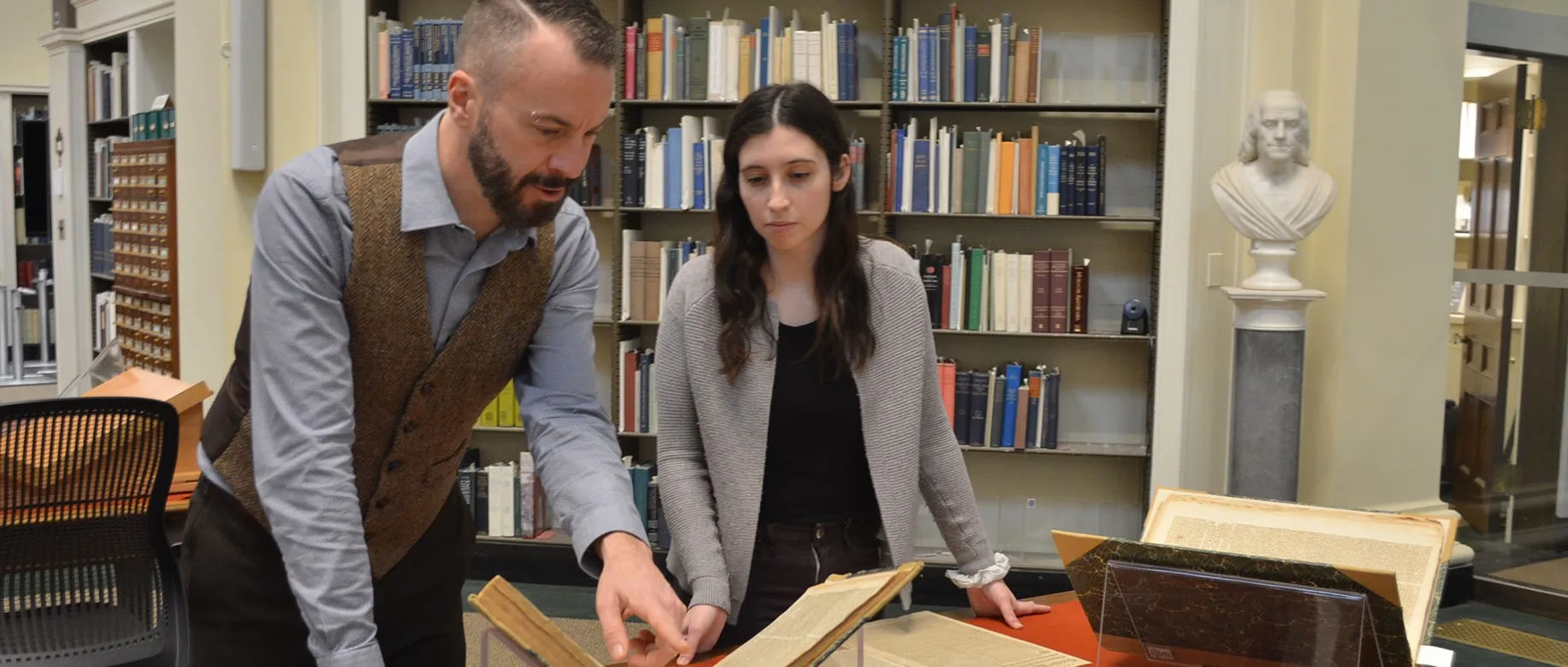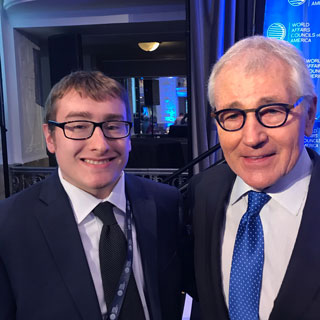Why Study History?
Studying history does more than tell us who we were; it tells us who we are today. When you study history at Assumption, you’ll be immersed in the political, social, and economic trends and traditions that shaped the past—and our own lives. Through rigorous study of primary resources, spirited discussion with your classmates and our dedicated faculty, and access to renowned libraries, museums, and study abroad programs, your time at Assumption will prepare you for a career in a field you love—and to make history.
Why Study History at Assumption?
As a history major you will:
- study the past in different ways than you experienced in high school, including forming your own interpretations of original sources created decades, centuries, and even millennia ago. You’ll decipher the meanings of letters, newspapers, maps, paintings, advertisements, architecture, movies, and many, many more kinds of primary sources.
- take courses that treat the greater Worcester area as your classroom. Your professors will lead visits to the Worcester Art Museum, the American Antiquarian Society, the Museum of Russian Icons, the Hanover Theater, Mechanics Hall, local churches, synagogues, and mosques … and even Assumption’s campus in Rome.
- complete a major research project under the guidance of a history professor. You’ll finish this project by the end of the fall semester of your senior year so you can include it in your portfolio when you apply for jobs, internships, or graduate programs.
- learn how to recognize biased opinions and “fake news” through careful consideration of all kinds of evidence. In the process, you’ll further develop your ability to express your own views in a convincing manner, backing up your ideas with facts and evidence.
- be prepared to enter a career in just about any field, including law, business, education, government, and nonprofits. Your professors will help you cultivate skills that employers value, including thinking contextually, managing information responsibly, expressing ideas clearly, and working independently.
Carl Robert Keyes, Ph.D
Faculty
Experiential Learning
Assumption's Rome Campus
At Assumption's campus in Rome, Italy, the city and the country become your classroom through daily and weekend-long excursions throughout "the eternal city" and the Italian countryside. This unique study abroad experience will enrich your academic and cultural pursuits as you walk in the footsteps of emperors and gladiators then enjoy delectable Italian cuisine or perhaps a cappuccino after class in a local cafe. (Did you know that your financial aid follows you to Rome?)
Explore the Rome CampusLearn the Skills Employers Seek
Research Assistants and Faculty Mentors
Assumption offers opportunities for students to gain practical experience and develop a deeper understanding of their field of study by participating in collaborative research with faculty members. History students are eligible to apply for the D’Amour College Summer Scholars Program and Honors Program Summer Research Fellowship. Other opportunities are also available via independent study courses directed by history faculty. Recent faculty-student research projects include:- Black Education in the Emancipations South
- Curating the Slavery Adverts 250 Project
- Nineteenth-Century Abolitionist Colleges and Literary Societies
Internships
All Assumption students can participate in the University’s internship programs and spend a semester gaining practical experience. Internships-for-credit may also count as courses for completing a history major. Recent internship sites include:- Archives and Library, Worcester Historical Museum in Worcerster, Massachusetts
- Barnes Museum, a historic homes museum in Southington, Connecticut
- Special Collections, Leicester Public Library in Leicester, Massachusetts
Study Abroad
During the fall and spring semesters as well as over the summer, many of Assumption’s history majors travel the world while taking part in exciting study abroad programs. Others choose to spend a semester at Assumption’s Rome Campus. No matter their destination, they soak in the past and other cultures when they live in the places that they study in their European and World history classes, gaining greater appreciation for the experience.Career Paths
Majoring in history prepares you for a wide variety of careers. These are some of the most common career paths for history majors:
Curator
Historical Interpreter
Educator
Documentary Filmmaker
Cultural Resources Manager
Politician
Lawyer
Archivist
Librarian
Historical Consultant
Historic Preservation Specialist
Policy Advisor
First-rate Academics in a Catholic University Setting
Assumption University awakens in students a sense of wonder, discovery, and purpose, forming graduates known for their intellectual seriousness, thoughtful citizenship, and devotion to the common good. Students are provided an education that shapes their souls, forms them intellectually, and prepares them for meaningful careers. Enlivened by the harmony of faith and reason, here, students’ minds and hearts are transformed.
Assumption is dedicated to providing a clear understanding of what your education will cost
Pathways to Success
Graduate Schools
- Boston College
- College of William and Mary
- Fordham University
- Pennsylvania State University
- Providence College
- Salem State University
- University of Massachusetts Amherst
- University of Rhode Island
- Western New England University School of Law














